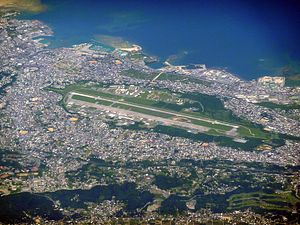On Monday, Okinawa Governor Takeshi Onaga said that he is taking steps to rescind local government permission for land reclamation work needed to construct a new U.S. military base in Okinawa’s Nago district. The new base would replace an existing the U.S. Marine Corps air station at Futenma, part of a relocation plan first agreed upon by the U.S. and Japanese governments in 1996.
The relocation of the base to another site within Okinawa has met fierce opposition from locals, who want other parts of Japan to share the load of hosting U.S. troops. Onaga was elected as Okinawa’s new governor in November 2014 after strongly opposing construction of the new base. Since then, he has tried various tactics to force Japan’s central government to rethink its plan. In March, he ordered the Defense Ministry to halt construction work, citing environmental concerns, only to have that ordered overturned by the courts.
Onaga even visited the United States in June to convey Okinawa’s position in person, but to no avail – both Tokyo and Washington have remained firm on the stance at the project must move forward.
“[T]he governments of the United States and Japan share an unwavering commitment to the construction of the Futenma Replacement Facility,” the State Department said in a statement issued after talks with Onaga.
Last month, Abe’s administration offered an unexpected olive branch to Onaga and the anti-base camp: a month-long halt on construction, during which the central and local governments would hold “intensive talks” on the basing issue. Onaga, for his part, promised not to revoke local government approval for the construction work while the talks were ongoing. The approval for the land reclamation was issued by Onaga’s predecessor, Hirokazu Nakaima.
The talks came to an unsatisfying conclusion last week, with no progress made on the central issue. Chief Cabinet Secretary Yoshihide Suga announced that preparations for the U.S. base would resume on September 12, and so it did, despite protestors in canoes who attempted to disrupt workers. Tokyo hopes to finish drilling surveys in September before moving on to the actual land reclamation work.
But Onaga announced today that he is making good on a long-standing threat to rescind local permission for the land reclamation. In a press conference, Onaga said that the original approval had “defects that must nullify it,” according to Asahi Shimbun. He said a panel had pointed out the “legal defects” in the approval after a “detailed checking of its contents.”
The process of actually withdrawing the approval will take around a month. Onaga will hold a hearing on September 28 with the Okinawa Defense Bureau, meaning he won’t be able to officially rescind the approval until early October at the latest. But the wheels are set in motion, as Onaga has officially told the Okinawa Defense Bureau, a part of Japan’s Defense Ministry, of his intentions.
“This is a major step to realizing my campaign promise, which was to use all available means to prevent the building of a new base at Henoko,” the Japan Times quoted Onaga as saying.
The central government, meanwhile, maintains that the initial approval granted by Nakaima is valid. Analysts expect a court battle between the two sides over the issue, delaying construction while further exacerbating tensions between Okinawa and Tokyo.
As Yuki Tatsumi pointed out in a previous analysis for The Diplomat, Abe’s government has legal options that would allow it to continue construction even without Onaga’s approval. Onaga may not be able to actually halt the project in the end, but he can make it as difficult – and politically costly – as possible. Abe’s approval ratings have already taken a hit as he moves new defense bills through the Diet; forcing the Okinawa issue so soon after the security legislation package could exacerbate public opposition.
Meanwhile, Onaga is taking his fight to a global stage. On September 19, the governor will leave for Geneva, Switzerland, where he is expected to give a speech about Okinawa’s position on the basing issue before the UN Human Rights Council.

































